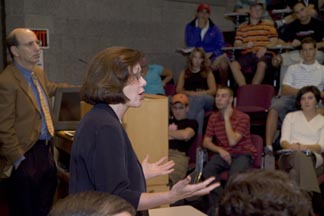'Change to Win' is more likely to hurt than help labor, say ILR panelists
By Linda Myers

"I love that bumper sticker: 'Remember the labor movement -- it brought you the weekend,'" said Harry Katz, dean of Cornell University's School of Industrial and Labor Relations, speaking of the U.S. labor movement's enduring legacy. But mention the labor movement today, and people are likely to think only of its decline, said Katz.
His introductory talk to a packed house of students, faculty and staff in 105 Ives Sept. 2 kicked off the ILR School's 2005 Pre-Labor Day event.
Only 8 percent of the private sector is currently unionized -- down from 80 percent in its heyday, decades ago, when "Made in the USA" was the rule, not the exception. This summer, the Service Employees International Union, UNITE-HERE, co-led by ILR alumnus Bruce Raynor, and other key unions made headlines when they broke away from the AFL-CIO federation of unions. The maverick alliance, which faults the AFL-CIO for being mired in the past, has billed itself "Change to Win."
The dramatic split was the impetus for the ILR School's decision to forgo a talk by a national labor leader at its annual event, said Katz, and instead feature its own faculty members in a panel discussion on the impact of the separation.
"Change to Win could have made a difference if enough unions had rallied," said Richard Hurd, professor of labor studies. But a much more likely scenario is that the split will escalate the conflict among different groups, he said.
"It doesn't make for a very happy Labor Day. I have a hard time imagining labor finding its way out" of the long-seething divisions that prompted the split, said Jeff Cowie, assistant professor of collective bargaining, labor law and labor history. He gave a historical overview, drawing a distinction between the unique events of 1935 -- with workers so anxious to get out of the Depression that they were willing to "face down goon squads, take over factories" -- the periodic labor squabbles since then and the events of today, when the United States is "riven by culture wars, not class wars."
Cowie faulted the AFL-CIO, formed through a triumphant merger in 1955, for its failure since then to organize the service sector or give leadership roles to blacks and women. "But," he added, "I have a harder time imagining what this world would be like without the collective voice of American workers."
"Ideally, if management is enlightened, you no longer need unions," said Rosemary Batt, the Alice Cook Professor of Women and Work, in response to a question from the audience about whether unions still have a place. "But management practices differ. Driven by Wal-Mart, the trend now is a race to the bottom. Even when management wants to do the right thing, the pressure is not to do it."
"Unions need to work beyond national boundaries toward a global unionism," said Hurd. "So far, neither side in this debate has. The focus seems to be fighting free trade." Meanwhile, "in this era of George W. Bush, free-market ideology is reducing real wages for low-skilled jobs." Nevertheless, "hope remains through grass-roots activism and leaders with foresight … that a new form of unionism can emerge from the ashes of the old," he said.
Media Contact
Get Cornell news delivered right to your inbox.
Subscribe